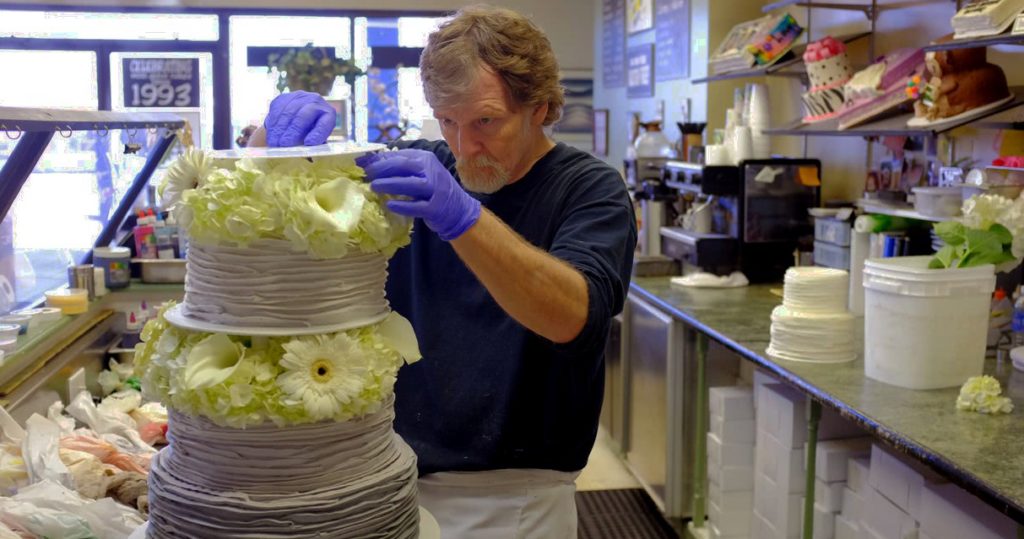
by Marci A Hamilton
Editor’s Note: This was first published at Justia/Verdict on June 7, 2018
The United States Supreme Court predictably handed down the Masterpiece Cakeshop v. Colorado Civil Rights Commission decision in June, toward the end of the Term. The case—which on its surface posed the question whether a bakery could turn away a gay couple seeking a wedding cake—didn’t decide that issue. Instead, the Court, in an opinion written by Justice Anthony Kennedy, pivoted to familiar ground for the Court: robustly protecting the right to believe anything at all combined with a warning that conduct can be regulated.
The case was a culture war waiting to erupt—evangelical Christians stood solidly behind the baker’s refusal to produce a cake for a wedding inconsistent with his faith and LGBTQ advocates stood with the couple’s right to obtain a cake from any merchant consistent with the public accommodations law. Had either side decidedly won, which neither did, we would have had gloating on one side and disaffection on the other. That’s just human nature. The opinion just didn’t go there.
The Court Sides with Civil Discourse Above All Else
Instead, the Court, by a vote of 7-2, found that the Commission had expressed animus against the baker’s beliefs when Commissioners discussed the history of illegal behavior by religious entities and then mentioned Naziism and slavery in the context of referring to the baker’s beliefs against same-sex marriage. Accordingly, the Court held that under the Free Exercise Clause the government may not express animus toward any religion.
Many have noted that what the Commission actually said was not historically inaccurate. It’s just a fact that religious entities have played a part in some of the world’s greatest tragedies and oppression. True. But they are missing the Court’s point: they can say that as private individuals, but the government needs to tread carefully when it characterizes and addresses religion or religious actors.
The message here was that government needs to be neutral, indeed, not just neutral, but ruthlessly neutral when it considers religious claims. It needs to go out of its way to be neutral. I see nothing wrong with that message. In fact, it fits with the First Amendment’s absolute right to believe anything you want. And it does not matter to the Court what religious faith it is facing. According to the Court’s reasoning, the Commission would have to be as careful criticizing Nazism as it must be in considering evangelical Christianity.
Yet, the Court did not at any point say that the baker had a right to discriminate against any couple. Quite to the contrary, the decision repeatedly affirms the reasoning of Obergefell v. Hodges and the dignity interest of same-sex couples.
Moreover, Justice Kennedy repeatedly made a statement I did not expect to figure into the decision but it became part of the scaffolding. At the time of the refusal, same-sex marriage was not yet legal. In other words, the baker had more reason to think then that he was acting within the bounds of the law than he might, say, now, after Obergefell. The Court was giving this baker an out, which none today would have.
Then the Court left the decision there, with the Commission’s mishandling of its own discourse. It didn’t defend the baker. Nor did the Court give a wink and a nod to all storeowners to discriminate away. Instead, it would appear that a neutral Commission could impose the public accommodations law on a baker and require service.
It’s Just the Free Exercise Clause
Then there was the issue the Court refused to take up, quite wisely. Conservatives argued vociferously and quite self-righteously that the baker had a free speech right not to be compelled to put a message on a cake with which he disagreed. The Court would have none of it, instead treading on the familiar ground of the First Amendment’s Free Exercise Clause’s principle of neutrality toward all beliefs, no matter how offensive or outrageous.
This decision will be quite helpful in the clergy sex abuse cases as it dissects belief from conduct. Courts are being warned to not get into the business of second-guessing the beliefs of a religious entity, but that is no reason to race from the scene, giving them so-called “autonomy” for fear of going too far. Instead, they must be careful to be respectful of the right to believe, must look solely at the conduct, and then issue rulings that fit the conduct.
That’s the First Amendment through and through, nothing new. It’s Employment Div. v. Smithall over again. The lesson of Smith is ruthless neutrality as it opens the door to prevent religious actors form harming others. It’s not easy but it is the pathway to peace amidst diversity.
Marci A. Hamilton is the Fox Professor of Practice in the Program for Research on Religion in the Fox Leadership Program at the University of Pennsylvania; the founder the non-profit think tank to prevent child abuse and neglect, CHILD USA; and author of God vs. the Gavel: The Perils of Extreme Religious Liberty and Justice Denied: What America Must Do to Protect Its Children. Her email address is hamilton02@aol.com






























Is the problem making the cake? or the inscription on the cake?
Guy brings his torn trousers to the tailor shop. Tailor asks “Euripides?”
Customer nods, asks “Eumenides?”
Tailor hands the trousers back. “Euripides, EUmenides.”
Don, it’s that sort of issue.
The fun starts at 1.20
.
https://www.youtube.com/watch?v=FZXpaSXdvA4
Won’t bother it’s all stupid now Romans chapter 1 read it
So a black gangsta walks into a cake shop and wants a cake showing him humping his ho. The cake shop owner declines and recommends a shop down the block that will make any cake you want.
The ‘gangsta’ could give a shit, but decides it is a good issue to sue for damages for racial discrimination and sexual orientation bias. Besides, it makes him kewl with his own crowd.
I’m getting tired of this kind of crap…
If I want a good car mechanic, I find someone that is a good mechanic for my particular car. I sure as Hell don’t go looking for a mechanic that doesn’t want anything to do with my particular car.
Here here
Neutral ? More like an attempt to defuse a back-fired social engineering program.
The definition of a bad law is one that can’t possibly be consistently enforced and the truth is that no Western government has the will or the means to control privately owned & operated enterprises .
Just look at employment: If someone starts a small business don’t tell me they’re not going to favour family members and those of a similar cultural persuasion when it comes to picking the staff. Forcing people to do what goes against the grain doesn’t produce anything of any material or social worth; which goes to the fact that such agendas are cooked up by those who couldn’t give a damn about either
A quote from the 3rd to last “Society” article published on Gumshoe:
“The American ruling class loves Identity Politics, because Identity Politics divides the people into hostile groups and prevents any resistance to the ruling elite. With blacks screaming at whites, women screaming at men, and homosexuals screaming at heterosexuals, there is no one left to scream at the rulers”.
https://gumshoenews.com/2018/05/26/a-conversation-on-race/
Phoenix Arizona has a “public accomodation law”. So, right after the decision in Masterpiece (the name of the bakery) case, a judge in Arizona said a stationery store can’t refuse to print wedding invitations for gay couples.
In other words, the Bakery decision is seen to be a decision about the bakery only.
Or something like that.
https://mic.com/articles/189741/arizona-court-rules-against-same-sex-wedding-invitation-discrimination-days-after-scotus-ruling#.ybvjRgwTY